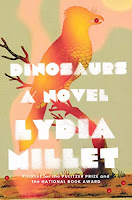Celeste Ng imagines a present-day—or near present-day—dystopia in Our Missing Hearts, where a wrenching economic depression in the U.S. has revved up government surveillance of its own citizens to a fever of paranoia. Ng’s portrayal of this America recalls Stalin’s Soviet Union where citizens are rewarded for informing on neighbors. And for good measure she overlays that chilling memory with the contemporaneous and sinister ethnic hatred which infected Nazi Germany. This is the ghastly backdrop for Ng’s powerful novel, in which courage, the power of words, and the importance of memory provide their countervailing force. This book is gritty, hauntingly effective, and beautiful.
As we meet Bird, he’s just entering junior high in Cambridge, Massachusetts. He lives in a high-rise dormitory on the campus of a famous university with his father, Ethan Gardner. Ethan shelves books at the library, but used to be a lecturer in linguistics. He has plummeted in the workplace and in society’s esteem, because an innocuous nature poem published by his wife Margaret Miu becomes the focus of resistance to the government’s institutionalized ethnic hatred.
With strong curiosity and a growing sense of his mother’s soul, Bird runs away to New York to find her, following clues as well as any detective. This quest shows courage and resourcefulness, and is told in fairy tale terms, complete with a beautiful, enchanted queen, and a counterbalancing shocking violence. The climax, with its pervasive and stunning act of resistance, ranks as one of the most powerful fictional episodes in my memory. It is a testament to the power of storytelling and memory, particularly when the story being told carries moral weight. Oh, take up this book for its ultra-worthy and reverberant climax.
Needless to say, you won’t pick up this book for a neat-and-tidy ending; there’s no pretty bow to untie and store away. For this is a book that hits modern society hard, and highlights in bright relief the need, the desperate requirement, for connection and understanding.
As we meet Bird, he’s just entering junior high in Cambridge, Massachusetts. He lives in a high-rise dormitory on the campus of a famous university with his father, Ethan Gardner. Ethan shelves books at the library, but used to be a lecturer in linguistics. He has plummeted in the workplace and in society’s esteem, because an innocuous nature poem published by his wife Margaret Miu becomes the focus of resistance to the government’s institutionalized ethnic hatred.
With strong curiosity and a growing sense of his mother’s soul, Bird runs away to New York to find her, following clues as well as any detective. This quest shows courage and resourcefulness, and is told in fairy tale terms, complete with a beautiful, enchanted queen, and a counterbalancing shocking violence. The climax, with its pervasive and stunning act of resistance, ranks as one of the most powerful fictional episodes in my memory. It is a testament to the power of storytelling and memory, particularly when the story being told carries moral weight. Oh, take up this book for its ultra-worthy and reverberant climax.
Needless to say, you won’t pick up this book for a neat-and-tidy ending; there’s no pretty bow to untie and store away. For this is a book that hits modern society hard, and highlights in bright relief the need, the desperate requirement, for connection and understanding.


















